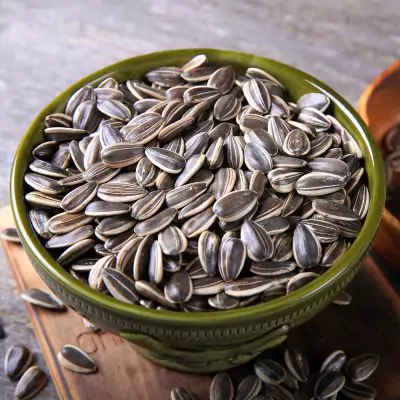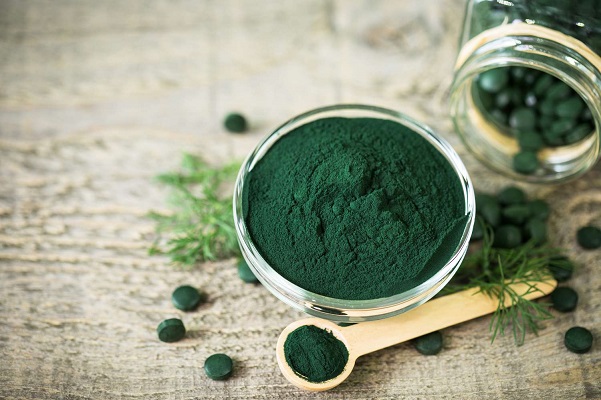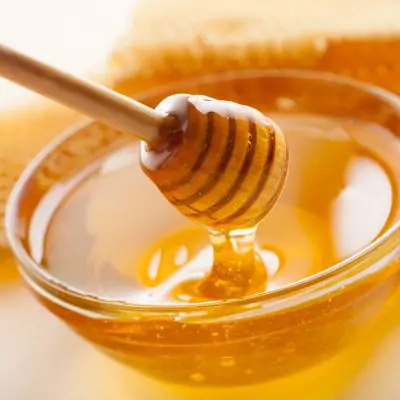On This Page
Overview
Sunflower seeds (Suraj Mukhi ke beej) are tiny seeds, they are incredibly filled with vital minerals. These little seeds are a gem of vital nutrients that give you a plethora of beneficial health advantages. Despite being small, they are regarded as a superfood. These small, white seeds are protected by shells that are a dark grayish-black color.
The flavor of these tender seeds is mildly nutty. You may either roast them to enhance their flavor or eat them raw. Let’s examine some of the advantages, remedies, and adverse effects of these seeds.
Synonyms of Sunflower seeds
- Surajmukhi Ke Beej
- Helianthus annuus
Nutritional Facts of Sunflower seeds
¼ cup of dry roasted sunflower seeds contains:
| Calories: | 207 |
| Fiber: | 3.9 grams |
| Carbohydrates: | 7 grams |
| Protein: | 5.8 grams |
| Fat: | 19 grams |
Phytochemical Constituents of Sunflower seeds
- Alkaloids
- Phenols
- Flavonoids
- Saponins
- Tannins
Therapeutic Uses of Sunflower seeds
- Packed with Antioxidants
Sunflower seeds are a good source of plant components such as phenols, tannins, saponins, and flavonoids, which act as antioxidants. To shield the body from the harm caused by free radicals, antioxidants are necessary. Additionally, plant substances have potent anti-bacterial, anti-inflammatory, and anti-fungal capabilities that shield the body against illnesses.
- Overcomes Depression
Today, stress is an unavoidable part of our lives to overcome this, these sunflower seeds are very helpful.
Sunflower seeds, which are high in magnesium, can lessen the signs of depression and anxiety.
- Weight Loss
Consuming sunflower seeds can help you lose weight. These seeds can aid with weight loss. Sunflower seeds are the most effective for slimming down. This is because they include a sufficient quantity of protein and lipids, which are crucial for preventing the buildup of fat. Additionally, they boost energy, which aids in weight loss and promotes long-term health.
- Combats Anaemia
It is well-known that persons with anemia have decreased quantities of hemoglobin and RBCs as a result of iron deficiencies. Numerous factors, including significant blood loss or low iron and folic acid intake, can contribute to its occurrence. Sunflower seeds have a sufficient amount of iron and folate and provide the proper amount of nourishment to support your fight against anemia.
- Control Blood Sugar Levels
It has been seen that those who consume a diet including seeds and nuts have a lower risk of diabetes. These seeds can help diabetics control their blood sugar levels and avoid unexpected rises. Additionally, these tiny seeds stop the emergence of insulin resistance.
Home Remedies Sunflower seeds
- Give Energy
Sunflower seeds have plenty of vitamin B1. Thiamine (vitamin B1) aids in the conversion of the proteins, lipids, and carbs in our food into energy. A handful of sunflower seeds can provide you with immediate energy.
- Protects from UV rays
Sunflower seeds also serve as sunscreen and offer excellent sun protection, which is another fantastic advantage. It also aids in healing skin damage brought on by a lifetime of UV exposure. This is made possible by the presence of beta carotene, which is crucial in lessening your skin’s sensitivity to damaging solar rays.
- Prevent extreme hair loss
The seeds are packed with vitamin B6, or pyridoxine, which boosts the body’s absorption of zinc and significantly increases the amount of oxygen delivered to the scalp. These result in less hair falling out and provide relief from sudden hair loss.

Have A Health Issue?
Consult Online
- Dr. Sahil Gupta (B.A.M.S., M.H.A.)
Ayurvedic Allergy Specialist
CEO & Founder of IAFA®
Ayurvedic Aspects of Sunflower seeds
These vibrant yellow flower seeds have long been used in Ayurvedic therapy. Sunflower seeds are used to pull oils for massages and cooking. Because it naturally contains Kapha dosha and has cooling properties, utilizing this seed aids balance the pitta dosha.
Daily Dose: The recommended daily intake of sunflower seeds is one small cup (approximately 30 grams).
Side Effects of Sunflower Seeds
Excessive consumption of these seeds can cause skin allergies. selenium is a trace mineral found in sunflower seeds an excessive dose can cause symptoms like skin rashes and hives.
Conclusion
A superfood that works well with virtually every meal is sunflower seeds. They are packed with vitamins and minerals that support health and help keep the body healthy. But excess of anything can be harmful so with these seeds its extreme dosage can result in skin allergy. So Be careful before consuming it at high levels.
If you have used more of it and you become a victim of allergies due to its excessive use, then there is no need to worry, you can get the ayurvedic natural handling of this allergy only and only from Dr. Gupta at IAFA who is a specialist of handling allergies through Ayurveda. you can book your online consultation with Dr. Gupta without any delay.
References
- US Department of Agriculture: “Seeds, sunflower seed kernels, toasted, without salt“
- https://www.researchgate.net/publication/314216869_PHYTOCHEMICAL_ANALYSIS_OF_HELIANTHUS_ANNUS_LIN_ANGIOSPERMS_ASTERACEAE









